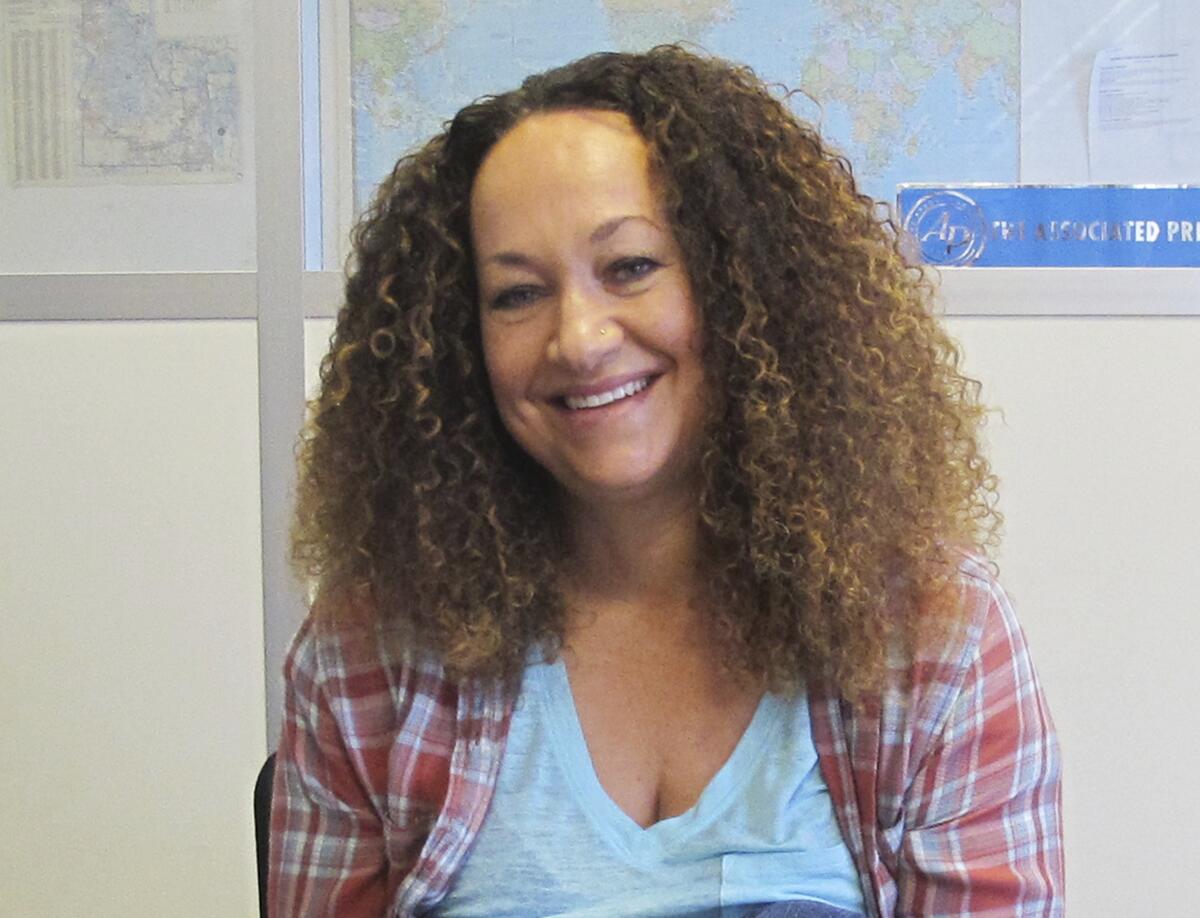Opinion: What’s going on with all the white scholars who try to pass as Black?

As a nation, we may be moving toward more consciousness about Blackness, but for most Americans Black consciousness remains a mystery. We, the people, have wanted it that way: for most of our history, racism has urged us to substitute stereotypes, distortions and patronizing assumptions for any real understanding of who Black people are.
These days, as white folks wrestle with how to learn on a large scale, we’ve come across a somewhat novel problem: Individual whites pretending to be Black — what I call “passe noir.” They tend to be in career positions usually occupied by Black people — the few career positions they usually occupy — first and most notably Rachel Dolezal, the white woman in Spokane who in 2015 was found to be passing as the Black head of the local NAACP. This year there was Jessica Krug of George Washington University, a well-regarded professor of Black studies whose book, “Fugitive Modernities,” is considered to be in the canon of histories of the African diaspora. More recently, CV Vitolo-Haddad was barred from taking a tenure-track position at Fresno State because it was discovered they’d been, as they put it, letting people think they were Black.
Most interesting is how quick these people were to condemn their own actions — or inactions — once they were found out. In an online essay posted on Medium, Krug didn’t hold back on the mea culpas for the sin of representing herself as a woman of color: “I should be canceled,” she wrote. Dolezal was similarly regretful; Vitolo-Haddad apologized for the “‘wrong turns” they made on the journey to understanding race. Being so thoroughly educated in the nature of Black oppression, these academics could hardly do otherwise. And yet, had they not been “outed,” they would have said nothing at all.
This, then, is a highly self-aware subset of racial impostors in a long line of impostors dating back to blackface minstrels. The most charitable reading of their passe noir is still a troubling irony: sincerely intentioned, empathetic white people felt they could only serve Black consciousness by going undercover, slipping on a Black identity like a costume rather than treating it like a set of distinct, and distinctly American, life experiences that need to be probed, not performed.
“All my mom did is say she was black and people lost their minds.”
Deplorable and even ridiculous as this is, it’s familiar. For me it’s personal: My family is from New Orleans, Creole people from the city’s Seventh Ward who are descended from America’s oldest practitioners of passing, albeit the opposite kind. Passe blanc is, of course, entirely different from its postmodern inverse. Most Creoles did it to survive, to keep a job or elude the many indignities of Jim Crow. If nobody asked, they didn’t tell, but they always lived with the anxiety of white folks finding out, and of suffering real consequences. Their identity “choice” was not really a choice: it was forced by racism, and it tended to be situational, not existential.
But all passing grows out of the secrecy and shame we’ve been conditioned to associate with Blackness, which is far more emotional than it is academic. Critical race theory, racial performance, intersectionality — all these rubrics are important organizing tools that can’t compare to the complex realities of lived Black life. Though it’s not required, Black experience feels foundational to Black studies, which is perhaps why some white people can’t feel legit in the field unless they fake it.
Being authentically Black is an obsession in this country, something that all the PhDs and bestselling empathy primers in the world can’t address. In fact, advanced degrees are often seen to work against authenticity. But no matter how woke or “down” they are, white people who claim to be Black (or let us think they are) are not joining the cause so much as self-serving: Their academic work would not be nearly as emotionally resonant if they presented it as white people. They would be seen as standing outside of it, and many white people desperately want in.
In her Medium essay, a chastened Krug wrote that she had eschewed her “lived experience as a white Jewish child in suburban Kansas City” in order to assume various Black identities throughout her life — “North African Blackness, then U.S.-rooted Blackness, then Caribbean-rooted Bronx Blackness.” Though she’d been a kind of roving target, it was clear that Krug had “crossed over” — the term Creoles use to mean passing permanently from one racial identity to the other. Crossing over is a kind of death, and this seemed to be Krug’s intention: to be reborn as Black. The particular “kind” of Blackness almost seemed beside the point, which was to leave whiteness behind for good.
Lauren Michele Jackson, a Black literature professor at Northwestern University, pointed out in a New Yorker piece that Krug had benefited indirectly from colorism. Many professors in her field are Black people with light complexions, fitting the historic pattern of lighter-skinned Creoles being more socially advantaged and likelier to have college degrees. Jackson suggests that Krug had slipped through the cracks by putting herself on that spectrum and exploiting the general reluctance to question it. Even in a field in which authenticity can matter, academics take Black identity at face value: Out in the larger world, who would identify as Black if they didn’t have to?
The author of “The Mothers” exceeds high expectations in her second novel, about two twins who flee from home and end up assuming opposite races.
What set off this year’s cascade of revelations was the death of H.G. “Hache” Carrillo, a respected novelist and teacher who had claimed to be Afro-Cuban. It turns out that was only half true. He was Black but American, born in Detroit. His was a more nuanced kind of passing, speaking more to the shame and sense of not-enoughness coded in being Black American. We occupy a caste that doesn’t exist in countries where there has been colonialism and slavery, but not Jim Crow segregation and degradation. As an author Carrillo wanted to be himself, but expanded — Black in America, but rooted elsewhere. Cuba and Latino culture had given him that expansiveness. Following the posthumous exposure of his largely successful escape from an African American identity, people began scrutinizing other writers who had coopted it.
Black studies has been an academic discipline for more than 50 years, an evolving set of topics and approaches that are, in theory, open to anyone. And yet we are often suspicious of anyone being legitimately interested in Blackness who isn’t Black herself. A white person like that must have a fetish, we think, or a traumatizing upbringing; they are at the very least a “cultural leech,” as Krug ruefully described herself, at least in part. Often that’s true.
One of the dictums of white supremacy is that white interest in Black people can only be prurient or transactional, never sincere and certainly never about equality. The particular problem for white scholars of Black studies is that the authority they seek can resemble supremacy, another way for white folks to say they know Black people better than they know themselves. Passe noir is an ill-conceived shortcut around this conundrum, but the conundrum itself is real, and this country has never really been interested in solving it.
The poet, essayist and author, most recently, of “Just Us,” discusses the evolving movement toward racial justice with Professor Marcus Anthony Hunter.
As the movement shifts in the wake of the George Floyd protests and talk turns to enlisting allies in a common project, the fact is that we need white people who deeply understand and respect Blackness in all its complexity. We need white people to be intensely interested and represent what that’s like, living an experience that is uncommon, and maybe difficult, but necessary.
For inspiration, we might study the life of Johnny Otis, the famous bandleader who was of Greek descent but identified with Black people his whole career — the only white person, to my knowledge, with a regular column in the Black weekly the L.A. Sentinel. When Otis wrote “us” he meant Black folk, but he included himself in the community because he lived in it, in more ways than one. His entrée was jazz music, and then R&B, but the connections went deeper than that. He lived, physically and otherwise, in that rarefied space of being a white ally who was also a fellow traveler. He didn’t pass because that wasn’t him, but chiefly because Black people didn’t want or need him to. That fiction, he knew, would have served no one.
Kaplan is a contributing writer to the Times Opinion pages.
More to Read
Sign up for our Book Club newsletter
Get the latest news, events and more from the Los Angeles Times Book Club, and help us get L.A. reading and talking.
You may occasionally receive promotional content from the Los Angeles Times.







